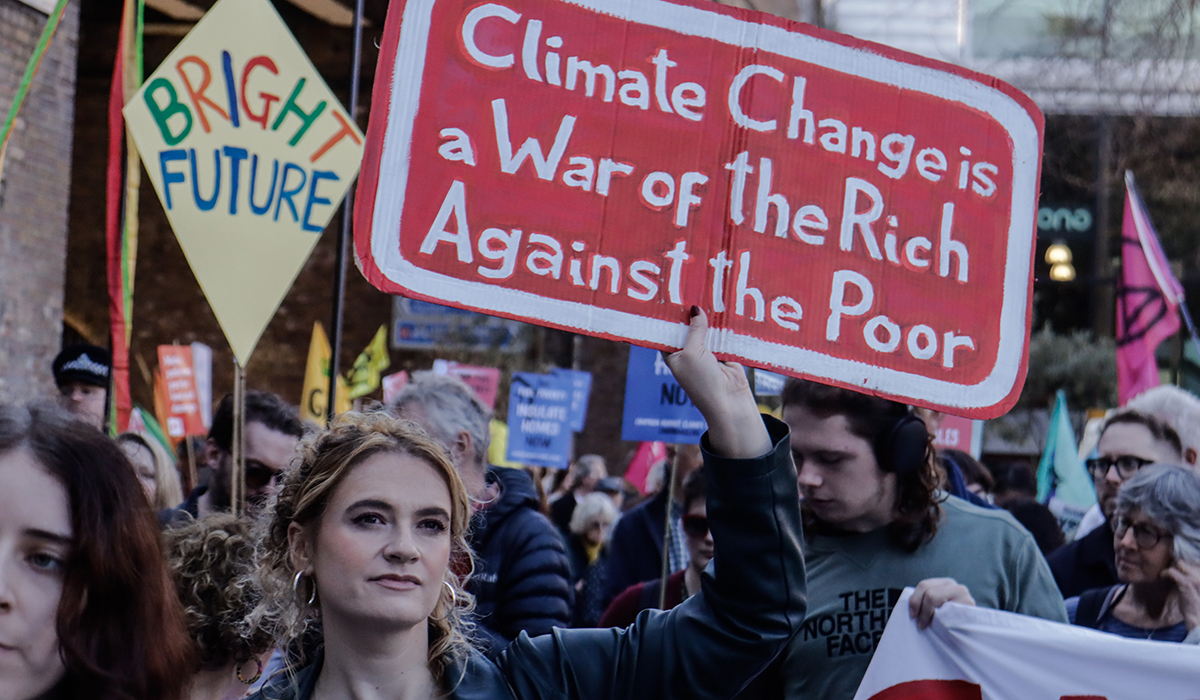 COP27 march, London. Photo: Steve Eason / CC BY-NC 2.0
COP27 march, London. Photo: Steve Eason / CC BY-NC 2.0
Elaine Graham-Leigh argues that the acute problems facing the planet require urgent action and radical change which will be bitterly opposed by our rulers
One lesson of this summer’s extreme weather across the globe is that the severity of the climate emergency alone is not going to propel politicians into the actions required. In the wake of the Tories’ win in the Uxbridge by-election, the Tories and Labour seem to be competing over who most can water down their already insufficient climate policies. The Times front page on 24 July summed it up neatly. The main picture showed some of the 19,000 tourists who had to flee the Rhodes wildfires caused by the extreme southern European heatwave, while the headline announced: ‘Tory retreat from green policies to woo voters’.
The perception that green policies are a vote-loser is at odds with polling data, as polls consistently show that people who are against us reaching net-zero emissions are a minority. There is, though, a difference between support for a general aspiration and support for specific policies. The problem is the frequency with which these specific policies come across as measures to decrease our living standards and/or put more pressure on already stretched budgets.
This means that climate policies both are easy targets for populist politicians and vulnerable to misrepresentation. This apparently happened in Uxbridge, with canvassers reporting that some voters believed that the Ultra-Low Emission Zone (Ulez), a measure to reduce air pollution by charging drivers of the most polluting motor vehicles, would affect every vehicle, not just the 10% or so that actually don’t meet the standard.
The answer to this is not to bemoan people’s lack of understanding of individual policies or of the climate emergency. What we need to do is to fight for genuinely collective responses to the climate crisis, rather than policies that treat people as individual, wealthy consumers. This means, for example, that rather than laws against domestic gas heating, we need to be campaigning for networked heat pumps everywhere, publicly owned as another utility. Instead of imagining that the owners of all the petrol and diesel vehicles on the roads just need to buy electric, we must continue to fight for decent public transport, in urban and rural areas, and a massive expansion of rail freight.
The record profits posted by companies like British Gas and the near collapse of Thames Water are both demonstrations of the obvious fact that utilities and other public services like transport need to be in public ownership. On its own, though, nationalisation isn’t a panacea. The current state of the railways shows that micromanagement by the Department for Transport isn’t much better than full privatisation, particularly when the government is determined to attack the rail unions. Not just public ownership but workers’ control is needed, so that public services can be run to meet the needs of people and the environment, not just the Treasury. This would also be a mechanism to ensure a genuinely just transition from carbon-intensive energy generation and production.
Achieving all this means that we need to be fighting alongside workers in struggle; with working people, not against working people. Groups like XR and Just Stop Oil have done an important job in keeping the climate crisis in the public eye and are obviously right in calling for no new oil and gas. Grant Shapps’ proposal to ‘max out’ North Sea oil and gas is absurd. The tactic of blocking roads and slow walking, though, can feel like activism at ordinary people rather than with us. At its worst, it can create that impression off from which right-wing populists feed, that environmental activism is aimed at making people’s lives harder.
As the record high temperatures of 2022 and 2023 have shown, climate change is no longer just an issue for our future selves to worry about. It is here now, and we have to both adapt to the warming we’re stuck with and take urgent action to keep that warming as limited as is still possible. This means we shouldn’t call for people to sacrifice, not even when justified by pointing out that if we don’t respond to the climate emergency, the effects of runaway climate change will be worse.
It means putting forward an expansive vision of what a sustainable society could look like, one that will be worth fighting for as a positive goal, not just as better than the unthinkable alternative. Keeping the climate movement at the heart of the fightback against the Tory government and the cost-of-living crisis must now be a priority as we respond to this warming world.
Before you go
Counterfire is growing faster than ever before
We need to raise £20,000 as we are having to expand operations. We are moving to a bigger, better central office, upping our print run and distribution, buying a new printer, new computers and employing more staff.

